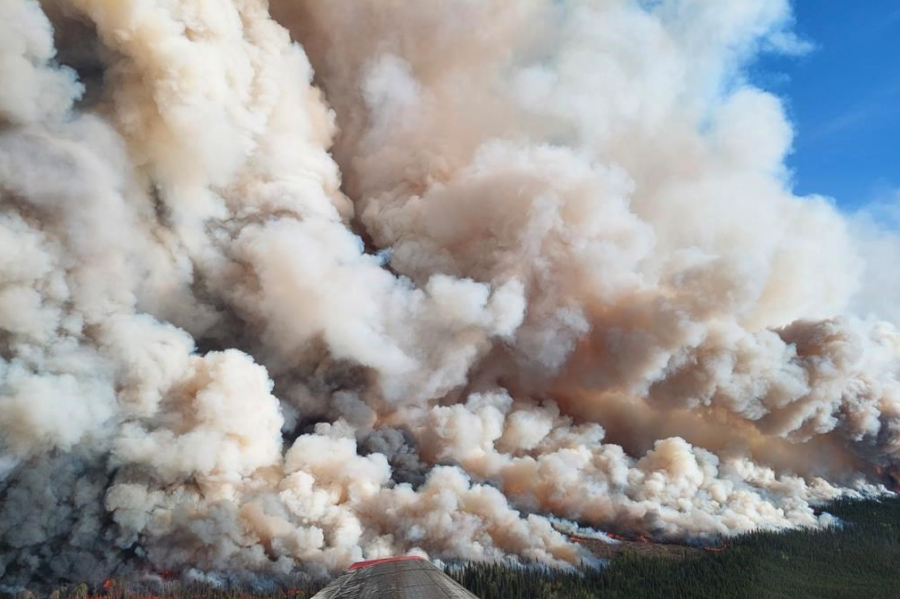(UPDATE: May 14 at 4:48 am): Duane Loe lives just three kilometres south of Fort Nelson, BC, where most of the 4,700 people have fled from a fast−approaching wildfire. But Loe isn’t leaving.
He has decided to stay put with a group of about a dozen other residents who have firefighting experience and plan to protect their homes and property.
The forecasts have called for westerly winds to push the Parker Lake blaze in their direction.
"We are safe," Loe said on Monday as the government urged all remaining residents to leave. "We understand that there (are) evacuation orders, but they can’t force you out. So, we are here to protect our property, our homes, the livestock and the land. That’s why we’re staying."
The response comes after BC Emergency Management Minister Bowinn Ma said that a small, unspecified number of residents won’t leave the Fort Nelson area in the face of a wildfire that grew to 53 square kilometres in size by Monday.

Forecasts say westerly winds late Monday into Tuesday are expected to blow the fire toward Fort Nelson — a risk that has triggered the Northern Rockies Regional Municipality and the Fort Nelson First Nation to expand mandatory evacuation orders to a wider swath of northeastern BC.
Ma said residents in the evacuation zone need to leave immediately for their own safety.
"It is an incredibly, incredibly difficult thing to leave your home when you are asked to evacuate due to wildfire, due to flood, due to any emergency reason," Ma said.
"I completely understand how this kind of stressful situation would cause people to wonder whether or not they want to stay," she said. "We are talking about people’s entire lives in some of these homes."
Loe, who has lived in the Fort Nelson area since 1960, said he believes about 50 people remain in the community along with several others in rural properties, with many prepared with rigs, pumps and other equipment to fight the fire if it does approach their properties.
Loe said those who stayed are watching over other people’s cattle that they left behind. They’re also looking after grocery stores full of food.
"We’re just hoping for rain on Wednesday and Thursday. We’re just hoping for the wind to change to the east, to blow the other way from the town, and that’s all, we’re praying. It’s in God’s hands right now."
The BC Wildfire Service said crews are battling "extreme fire behaviour" in the northeastern part of the province as the blaze burns a few kilometres from Fort Nelson, but calmer winds Sunday night and Monday morning slowed the fire’s growth.
Cliff Chapman, BC Wildfire’s director of operations, said forecasts called for winds to pick up again within a few days, and while their groundcrews focus on protecting structures, helicopters and bulldozers were being used on the fire line.
"It’s important to note that with the conditions and the dryness of the northeast right now, we’re seeing extreme fire behaviour, and so ground operations are often compromised," Chapman said Monday, noting 17 helicopters have been assigned to the area.
"Our focus really is about trying to do structure protection, structure defence, and reinforce our guards on those fires using heavy equipment and air support. So, it’s a joint effort, air and ground. You really need it to be a joint effort on any fire that has this type of fire behaviour."
The blaze is one of several burning across the West from Manitoba to BC, while smoke from the fires has prompted special air quality statements in the northern half of Alberta and part of Saskatchewan.
Environment Canada said winds near Fort Nelson on Tuesday will become westerly reaching 20 kilometres an hour in speed, with gusts forecasted to reach 40 km/h.
The forecaster said there is no significant rain in the forecast for northeast BC through to next Sunday.
Chapman said the fire situation has been worsened by dry conditions over the winter, which has led to a number of holdover fires buried in the ground lasting through winter and fanning to life this spring.
While the Parker Lake fire is classified as human−caused, two other out−of−control wildfires marking the evacuation zone’s boundary in northeastern BC are holdovers, and Chapman said there’s no doubt that last year’s record−breaking fire season has "amplified" the fire threat this spring.
"We planned for the holdover fires. That’s a big reason why we sent an incident management team up to Fort Nelson ahead of this Parker Lake fire, knowing that this cold front would likely expose where these holdover fires were still carrying heat, and that’s exactly what happened."
Ma said reception centres for evacuees have been set up in Fort St. John, Dawson Creek, Chetwynd and Prince George, and accommodation remained available Monday to people escaping the Fort Nelson fire who need it.
Meanwhile, the Doig River First Nation 60 kilometres northeast of Fort St. John, BC, has also issued an evacuation order, asking members to leave the area due to a spreading wildfire nearby.
In Manitoba, a fire in the northwestern part of the province is singeing the community of Cranberry Portage and has forced about 550 residents from their homes.
The blaze came within 1,500 metres of the community as residents were told to escape over the weekend, although reduced winds have allowed crews to hold the blaze to about 300 square kilometres.
Earl Simmons, Manitoba’s wildfire director, said that in the 40 years he has been working with wildfires, he has never seeing a fire that moved so quickly.
"It was growing two kilometres (an hour) on the head, the front of the fire."
Light rain is expected to play a supporting role in the wildfire outside the oilsands hub of Fort McMurray, Alta.
The fire is about 16 kilometres from the city of 68,000 that was overrun by a blaze in 2016 and 2,400 homes were damaged.
An evacuation alert went out Friday for the city as well as Saprae Creek Estates, Gregoire Lake Estates, Fort McMurray First Nation and Anzac.
Structure protections were being set up as precautions in a residential area outside Fort McMurray and the First Nation, while heavy equipment was working on the northeast side of the fire.
The forecast is for increasing wind for another fire burning near Grande Prairie, Alta.
The 14−square−kilometre wildfire is just four kilometres from the community of Teepee Creek and is burning out of control.
Parts of the rural area were evacuated Friday.
— By Chuck Chiang in Vancouver
(UPDATE: May 13 at 1:50 pm): Firefighters in British Columbia are battling "extreme fire behaviour" in the northeastern part of the province as a growing out−of−control blaze burns a few kilometres from Fort Nelson, BC.
Cliff Chapman, BC Wildfire’s director of operations, says calmer winds overnight and into today prevented the Parker Lake wildfire from spreading into the town, although it has now grown to 53 square kilometres in size.
Chapman says winds are forecasted to pick up again today, and crews are using helicopters and bulldozers to fight the wildfire, while most ground crews focus on protecting structures.
Evacuation orders by the Northern Rockies Regional Municipality and the Fort Nelson First Nation have been expanded to a wide swath of northeastern BC, and Emergency Management Minister Bowinn Ma says about 4,700 people have been ordered to leave since Friday.
Ma says highways 97 and 77 north of Fort Nelson are also closed, and the small number of people who have not yet evacuated are urged to leave immediately in the face of the approaching wildfire.
The blaze is one of several burning across the West from Manitoba to BC, while smoke from the fires has prompted special air quality statements in the northern half of Alberta and part of Saskatchewan.
(Original story: May 13 at 5:02 am): A fire behaviour specialist with the BC Wildfire Service says an intense wildfire could hit Fort Nelson this morning, based on forecasts that have been calling for strong winds.
Ben Boghean said in a video posted to social media Sunday night that the extreme fire behaviour, made worse by years of drought and a below−normal snowpack this past winter, could end up threatening the crews that have been fighting the Parker Lake wildfire.
Rob Fraser, mayor of the Northern Rockies Regional Municipality based in Fort Nelson, said yesterday that fire crews and emergency workers are preparing a "last stand" if the fire advances into the town itself.
The wildfire threatening Fort Nelson continues to grow, with the most recent update late Sunday night indicating it had swelled to nearly 53 square kilometres.
The BC Wildfire Service says the blaze is currently burning just two kilometres northwest of Fort Nelson, which has already seen about 3,500 people evacuate after an order to leave was issued Friday.
Fraser urged anyone who defied the order to leave immediately, warning local resources like water pressure and electricity may diminish or stop outright for public use since much of the supply will be directed to support firefighters trying to suppress the wildfire.
The province’s minister of emergency management Bowinn Ma said Sunday night to supplement limited accommodations for evacuees, the province is setting up an additional space with 200 rooms in Sunset Prairie, a community 440 kilometres south of Fort Nelson.
The blaze is one of several out−of−control wildfires in Western Canada threatening nearby communities in provinces such as Alberta and Manitoba.
"The wind is going to be sustained and it is going to push the fire towards the community," BC Wildfire’s director of operations, Cliff Chapman, warned in Sunday night’s update video about the fire threatening Fort Nelson.
"Escape routes may be compromised and visibility will be poor as the fire continues to grow."
Fires are also burning near Fort McMurray and Grande Prairie in Alberta, while officials in Manitoba have evacuated about 500 people from the community of Cranberry Portage some 700 kilometres northwest of Winnipeg.
The Regional Municipality of Wood Buffalo in northeastern Alberta has maintained an alert for Fort McMurray residents to be ready to evacuate on short notice, as the fire 16 kilometres to the southwest has reached 55 square kilometres in size.
Smoke from the fires have prompted air−quality alerts spanning from BC to Manitoba.
Despite the warnings for people in Fort McMurray to be ready to flee at a moment’s notice, schools there are still open Monday.
Both the public and Catholic school divisions in Fort McMurray say they continue to monitor the situation, and that they understand some parents may not want to send their kids attending school right now.
Both school divisions say that provincial achievement tests that were scheduled for this week are being postponed.

















